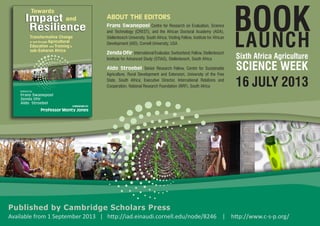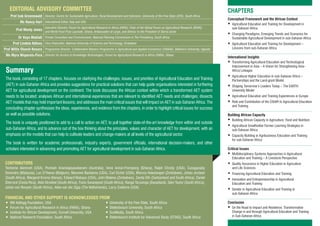Towards impact and resilience flyer 2013 07-05-3
The book focuses on clarifying the challenges and priorities of Agricultural Education and Training (AET) in sub-Saharan Africa and provides practical solutions to guide organizations in furthering AET. It discusses the African context for transforming AET and analyzes relevant African and international experiences. The book also examines relevant AET models and addresses critical issues impacting AET in sub-Saharan Africa. The concluding chapter synthesizes the ideas, experiences, and evidence to highlight critical issues and possible solutions for success. The book is intended to advance out-of-the-box thinking on AET principles and cultivating leaders, with an emphasis on models that can drive agricultural development in sub-Saharan Africa.


Recommended
More Related Content
Similar to Towards impact and resilience flyer 2013 07-05-3 (20)
More from FARA - Forum for Agricultural Research in Africa (20)
Towards impact and resilience flyer 2013 07-05-3
- 1. BOOKLAUNCH Sixth Africa Agriculture SCIENCE WEEK 16 JULY 2013 TowardsImpactandResilience:Transformative ChangeinandthroughAgriculturalEducationand Traininginsub-SaharanAfrica CSP Swanepoel,Ofir& Stroebel Transformative Change in and through Agricultural Education and Training in sub-Saharan Africa Edited by Frans Swanepoel Zenda Ofir Aldo Stroebel Towards andImpact Resilience FOREWORD BY Professor Monty Jones Published by Cambridge Scholars Press Available from 1 September 2013 | http://iad.einaudi.cornell.edu/node/8246 | http://www.c-s-p.org/ ABOUT THE EDITORS Frans Swanepoel Centre for Research on Evaluation, Science and Technology (CREST), and the African Doctoral Academy (ADA), Stellenbosch University, South Africa; Visiting Fellow, Institute for African Development (IAD), Cornell University, USA Zenda Ofir International Evaluator, Switzerland; Fellow, Stellenbosch Institute for Advanced Study (STIAS), Stellenbosch, South Africa Aldo Stroebel Senior Research Fellow, Centre for Sustainable Agriculture, Rural Development and Extension, University of the Free State, South Africa; Executive Director, International Relations and Cooperation, National Research Foundation (NRF), South Africa
- 2. CHAPTERS Conceptual Framework and the African Context ’é¦ Agricultural Education and Training for Development in sub-Saharan Africa ’é¦ Changing Paradigms, Emerging Trends and Scenarios for Sustainable Agricultural Development in sub-Saharan Africa ’é¦ Agricultural Education and Training for Development ŌĆō Lessons from sub-Saharan Africa International Insights ’é¦ Transforming Agricultural Education and Technological Improvement in Asia ŌĆō A Vision for Strengthening Asia- Africa Linkages ’é¦ Agricultural Higher Education in sub-Saharan Africa ŌĆō Partnerships and the Land-grant Model ’é¦ Shaping TomorrowŌĆÖs Leaders Today ŌĆō The EARTH University Model ’é¦ Agricultural Education and Training Experiences in Europe ’é¦ Role and Contribution of the CGIAR to Agricultural Education and Training Building African Capacity ’é¦ Building African Capacity in Agriculture, Food and Nutrition ’é¦ Agricultural Smallholder Farmer Learning Strategies in sub-Saharan Africa ’é¦ Capacity Building in Agribusiness Education and Training for sub-Saharan Africa Critical Issues ’é¦ Multidisciplinary Systems Approaches in Agricultural Education and Training ŌĆō A Livestock Perspective ’é¦ Quality Assurance in Higher Education in Agriculture and Life Sciences ’é¦ Financing Agricultural Education and Training ’é¦ Innovation and Entrepreneurship in Agricultural Education and Training ’é¦ Gender in Agricultural Education and Training in sub-Saharan Africa Conclusion ’é¦ On the Road to Impact and Resilience: Transformative Change in and through Agricultural Education and Training in Sub-Saharan Africa Summary The book, consisting of 17 chapters, focuses on clarifying the challenges, issues, and priorities of Agricultural Education and Training (AET) in sub-Saharan Africa and provides suggestions for practical solutions that can help guide organisations interested in furthering AET for agricultural development on the continent. The book discusses the African context within which a transformed AET system needs to be located; analyses African and international experiences that are relevant to identified AET needs and challenges; dissects AET models that may hold important lessons; and addresses the main critical issues that will impact on AET in sub-Saharan Africa. The concluding chapter synthesises the ideas, experiences, and evidence from the chapters, in order to highlight critical issues for success as well as possible solutions. The book is uniquely positioned to add to a call to action on AET, to pull together state-of-the-art knowledge from within and outside sub-Saharan Africa, and to advance out of the box thinking about the principles, values and character of AET for development, with an emphasis on the models that can help to cultivate leaders and change-makers at all levels of the agricultural sector. The book is written for academic professionals, industry experts, government officials, international decision-makers, and other scholars interested in advancing and promoting AET for agricultural development in sub-Saharan Africa. CONTRIBUTORS Teshome Alemneh (USA), Ponniah Anandajayasekeram (Australia), Irene Annor-Frempong (Ghana), Ralph Christy (USA), Canagasaby Devendra (Malaysia), Luc DŌĆÖHaese (Belgium), Maureen Bandama (USA), Carl Eicher (USA), Marcus Hakutangwi (Zimbabwe), Johan Jordaan (South Africa), Margaret Kroma (Kenya), Edward Mabaya (USA), John Makina (Zimbabwe), Zenda Ofir (Switzerland and South Africa), Daniel Sherrard (Costa Rica), Aldo Stroebel (South Africa), Frans Swanepoel (South Africa), Ranga Taruvinga (Swaziland), Glen Taylor (South Africa), Johan van Rooyen (South Africa), Akke van der Zijpp (The Netherlands), Larry Zuidema (USA) FINANCIAL AND OTHER SUPPORT IS ACKNOWLEDGED FROM ŌĆó WK Kellogg Foundation, USA ŌĆó University of the Free State, South Africa ŌĆó Forum for Agricultural Research in Africa (FARA), Ghana ŌĆó Stellenbosch University, South Africa ŌĆó Institute for African Development, Cornell University, USA ŌĆó SunMedia, South Africa ŌĆó National Research Foundation, South Africa ŌĆó Stellenbosch Institute for Advanced Study (STIAS), South Africa EDITORIAL ADVISORY COMMITTEE Prof Izak Groenewald Director, Centre for Sustainable Agriculture, Rural Development and Extension, University of the Free State (UFS), South Africa Ms Nancy Hart International Editor, Italy and USA Prof Monty Jones Executive Director, Forum for Agricultural Research in Africa (FARA); Chair of the Global Forum on Agricultural Research (GFAR); and World Food Prize Laureate, Ghana; Ambassador-at-Large, and Advisor to the President of Sierra Leone Dr Vuyo Mahlati Private Consultant and Commissioner, National Planning Commission in The Presidency, South Africa Prof Lindela Ndlovu Vice-Chancellor, National University of Science and Technology, Zimbabwe Prof Willis Oluoch-Kosura Programme Director: Collaborative Masters Programme in Agricultural and Applied Economics (CMAAE), Makerere University, Uganda Ms Myra Wopereis-Pura Director for Access to Knowledge Technologies, Forum for Agri┬Łcultural Research in Africa (FARA), Ghana
